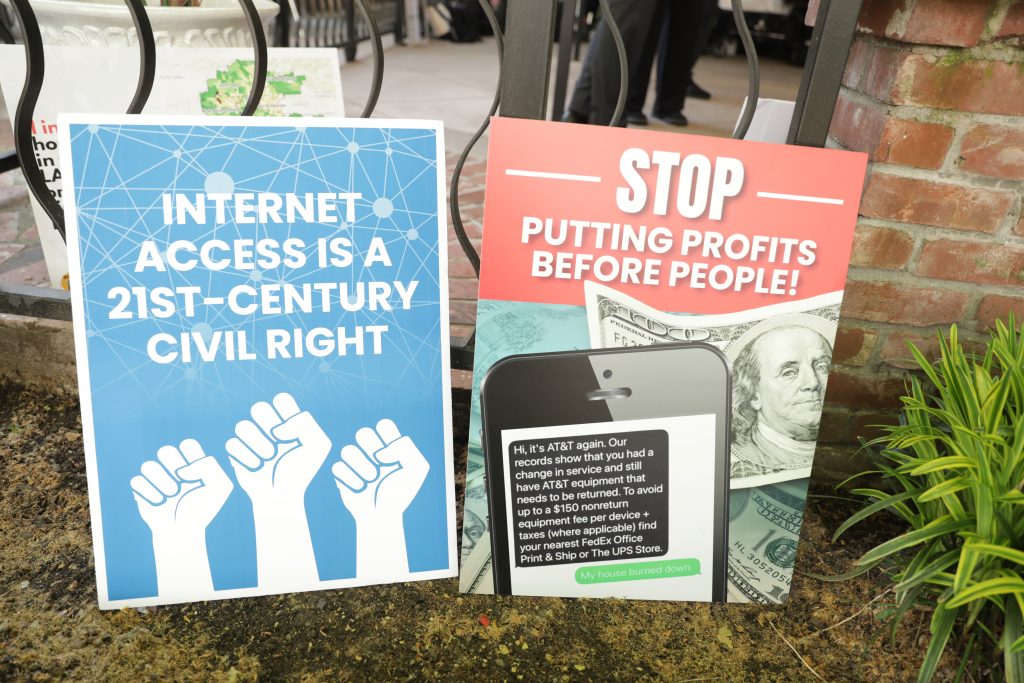
Let’s Talk… About Assembly Bill 353
Promise Lost: California’s “Broadband Affordability Bill” Betrays a Critical Opportunity
July 2, 2025
In January of this year, NextGen celebrated the introduction of Assembly Bill 353 by Assemblymember Tasha Boerner, a groundbreaking piece of legislation with the potential to tackle a stubborn aspect of the affordability crisis – namely high cost, low quality internet service due to industry consolidation and monopolization. By initially requiring Internet Service Providers (ISPs) to offer a low cost $15/month plan with 100/20 Mbps speeds for low income families, AB 353 sought to address the pressing and growing problem of a lack of affordable and quality internet plans to meet the modern demands of a 21st century digital economy. From the onset, NextGen and the California Alliance for Digital Equity (CADE) sought to partner with the author’s office, invigorated by the possibility of delivering to the people of California the gold standard of broadband affordability.
With all my heart, I wish I was writing to say that despite some tough challenges and strong opposition, the state is well on its way to accomplishing the goal of greater access to high quality, affordable broadband service for all. Frankly, that was the original intent of this blog post, until unacceptable amendments to the bill, driven by powerful corporate interests, completely upended the intent of AB 353.
Introduced on the heels of the U.S Supreme Court upholding and solidifying the discretionary authority of states to direct the creation of affordable broadband plans by major ISPs, AB 353 had the massive advantage of building upon the lessons from the rollout and implementation of New York’s own visionary, first of its kind broadband affordability law. Passed in April 2021 and part of its critical multiphase approach to closing the digital divide across New York state, this bold piece of legislation required large ISPs to offer a low cost, reliable plan for the baseline minimum standard of broadband at the time ($15/month for 25/3 Mbps, or $20/month for 200 Mbps) to low-income residents enrolled in certain public assistance programs. After three years of legal challenges from the telecom industry, New York's legislation not only provided California with a platform on which to build, it also acted as a perfect case study for which imperfections to avoid. After all, being the first always means there will be unforeseen gaps.

This is why from the beginning, we communicated early and often with the author’s office about the lessons learned from New York’s legislative efforts. Lessons that would help to ensure the creation of a stronger affordability mandate for California – one that would be more accessible, more impactful, and adaptable to the growing demands of the future. Unfortunately, none of the learning opportunities resulting from the shortfalls in the New York law were addressed. In fact, in many ways, AB 353 now opens the door for a whole new host of problems. Make no mistake, this bill has enormous potential, and the state has broad authority to go big. And yet, no common sense protections, enforcement mechanisms, nor improvements in enrollment or verification processes have been incorporated into its language. None of the recommendations our coalition has provided – based on what went wrong with New York’s implementation, including basic accountability requirements and state oversight – have been heeded.
And, perhaps most egregiously, upcoming amendments to the bill will only make it worse, essentially calling for the creation of a plan ($15/month, 50/10 Mbps), which is less than the federal classification of broadband (100/20 Mbps). In other words, the bill would now require ISPs to offer a low cost plan that is not broadband, as the speed is not fast enough to be considered so. What was once an extremely promising affordability bill, with the potential to help struggling California families access high quality, affordable broadband, is now just another classic example of a ineffective measure that squanders what is increasingly a rare opportunity: passing legislation that tangibly, reliably, and immediately addresses real kitchen-table issues for struggling California families. What is the reason for this? In simple terms, capitulation to heavy pressure from closed-door meetings with the ISP industry.
In a state that prides itself for setting the gold standard as the technology innovation capital of the world, why are we asking communities to accept substandard broadband service? This is not only terrible policy that threatens years of progress, this proposed language establishes a “separate and unequal” standard entirely devoid of clear public policy objectives, other than satisfying corporate interests. If we are to build a future full of opportunity and prosperity, every single community across our state must have access to fast, affordable and reliable internet. In our 21st century digital world, it should be as basic and non-negotiable as every home having clean running water and reliable electricity. After all, broadband access has become a social, economic, and health determinant, and failing to treat it as such limits the potential success of all current and future generations in California. By setting a new, substandard bar for so-called broadband service, AB 353 now won’t help to solve affordability or quality internet problems, instead it will lock low income communities into second-class connectivity while further entrenching them into the gulf of the digital divide.

Again, California has the broad authority to direct ISPs to offer a low cost broadband plan that provides actual internet (100/20 Mbps download speeds), with common sense consumer protections and oversight. What’s more, we know implementation of such a policy would not cost the major ISPs much. In fact, a recent independent report from Cal Advocates estimated that a “$15 per month broadband cap for low income subscribers would reduce the combined revenue of [providers] by less than one percent”.
Unfortunately, AB 353 is no longer a bill designed to address broadband affordability, but rather it is a bill disguised as doing so. It is now a policy measure riddled with corporate giveaways and one lacking the insights and input of the very communities who understand what is needed for this effort to be successful. As it is currently written, AB 353 not only sets a dangerous policy precedent, it is also this year’s legislative poster child for a massive missed opportunity. When you think about the deep frustrations Californians feel about the high cost of living, failing to pass meaningful legislation to provide affordable broadband service means a continuation of the same empty promises to address such issues. If lawmakers truly care about making life better and more affordable for those most in need, you do not get there by giving in to the demands of those perpetuating the status quo. As the bill moves to consideration in policy committees in the second house, State Senators and the Governor alike must now reject this ineffectual piece of legislation. California can and must do better.
Thanks for reading,
Arturo Juarez
